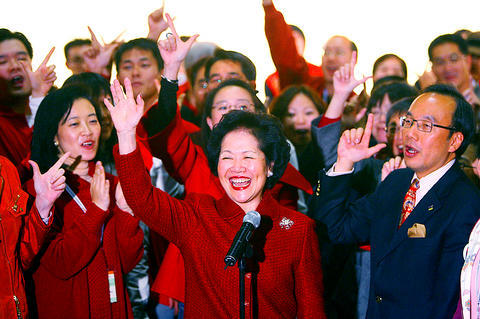Outspoken democrat Anson Chan (
But analysts warned that while Chan -- a former No. 2 in the government during both British and Chinese rule -- was an expert in administration, she would need to hone her political skills to gain allies and influence Beijing.
Chan, 67, dubbed "Hong Kong's conscience" for championing civil liberties, swept past her closest rival, former security chief Regina Ip (

PHOTO: AFP
Ip, who was backed by Beijing-allied parties but remembered for attempting to push through a deeply unpopular anti-subversion bill, shocked many by taking 43 percent of the votes.
The race was one of the most closely watched and fiercely battled elections since the territory was returned to China a decade ago, as both camps tried to turn it into a referendum on the pace of democratic reform.
"The result of this election indicates that Hong Kong people are anxious to put forward democracy. We think we're all ready to implement universal suffrage in 2012," the date of the next election for the territory's leader, Chan said in her victory speech early yesterday, before popping the cork on a bottle of champagne.
Analysts said that the win was a much-needed fillip for the pro-democracy camp who lost heavily in last month's district elections to the Beijing-friendly conservatives. But some warned Chan against taking too hard a line against Beijing in her push to hold the central government accountable.
"Right now, Beijing views Anson Chan with suspicion. It doesn't know her political motives," said James Sung (宋立功), a political academic at City University.
"When she was not in government, she could criticize Beijing's role in Hong Kong affairs as it didn't matter ... But now she's moved one step forward into government, into the political area, and that's what worries them," he said.
"Her first task will be gaining Beijing's trust and to do that she needs to tone down the fighting spirit that got her elected," he said.
Beijing has not commented on Chan's victory.
Chan was the first woman and the first ethnic Chinese to rise to chief secretary for administration, the No. 2 government post, under British rule. She continued in the post when the territory was handed back to China in 1997, but stepped down in 2001.
Chan's victory did allay some fears that political reform had fallen off the agenda amid an economic upswing in the territory.
"I think it shows that a lot of middle class people in Hong Kong still care about democracy, even though the economy is getting better, the stock market is rising, and the economy is more dependent on China," said Ma Ngok (
"This is something that Beijing needs to think about," Ma said.

MORE VISITORS: The Tourism Administration said that it is seeing positive prospects in its efforts to expand the tourism market in North America and Europe Taiwan has been ranked as the cheapest place in the world to travel to this year, based on a list recommended by NerdWallet. The San Francisco-based personal finance company said that Taiwan topped the list of 16 nations it chose for budget travelers because US tourists do not need visas and travelers can easily have a good meal for less than US$10. A bus ride in Taipei costs just under US$0.50, while subway rides start at US$0.60, the firm said, adding that public transportation in Taiwan is easy to navigate. The firm also called Taiwan a “food lover’s paradise,” citing inexpensive breakfast stalls

TRADE: A mandatory declaration of origin for manufactured goods bound for the US is to take effect on May 7 to block China from exploiting Taiwan’s trade channels All products manufactured in Taiwan and exported to the US must include a signed declaration of origin starting on May 7, the Bureau of Foreign Trade announced yesterday. US President Donald Trump on April 2 imposed a 32 percent tariff on imports from Taiwan, but one week later announced a 90-day pause on its implementation. However, a universal 10 percent tariff was immediately applied to most imports from around the world. On April 12, the Trump administration further exempted computers, smartphones and semiconductors from the new tariffs. In response, President William Lai’s (賴清德) administration has introduced a series of countermeasures to support affected

CROSS-STRAIT: The vast majority of Taiwanese support maintaining the ‘status quo,’ while concern is rising about Beijing’s influence operations More than eight out of 10 Taiwanese reject Beijing’s “one country, two systems” framework for cross-strait relations, according to a survey released by the Mainland Affairs Council (MAC) on Thursday. The MAC’s latest quarterly survey found that 84.4 percent of respondents opposed Beijing’s “one country, two systems” formula for handling cross-strait relations — a figure consistent with past polling. Over the past three years, opposition to the framework has remained high, ranging from a low of 83.6 percent in April 2023 to a peak of 89.6 percent in April last year. In the most recent poll, 82.5 percent also rejected China’s

PLUGGING HOLES: The amendments would bring the legislation in line with systems found in other countries such as Japan and the US, Legislator Chen Kuan-ting said Democratic Progressive Party (DPP) Legislator Chen Kuan-ting (陳冠廷) has proposed amending national security legislation amid a spate of espionage cases. Potential gaps in security vetting procedures for personnel with access to sensitive information prompted him to propose the amendments, which would introduce changes to Article 14 of the Classified National Security Information Protection Act (國家機密保護法), Chen said yesterday. The proposal, which aims to enhance interagency vetting procedures and reduce the risk of classified information leaks, would establish a comprehensive security clearance system in Taiwan, he said. The amendment would require character and loyalty checks for civil servants and intelligence personnel prior to